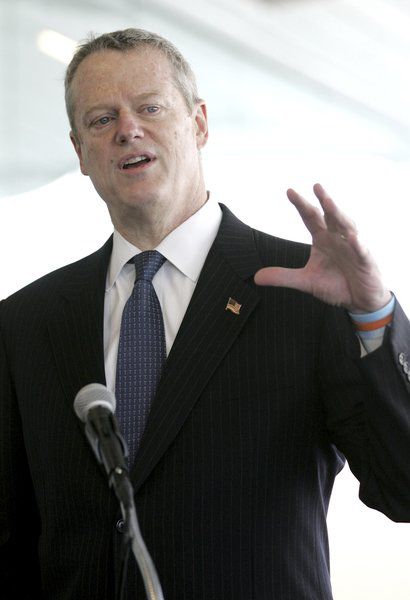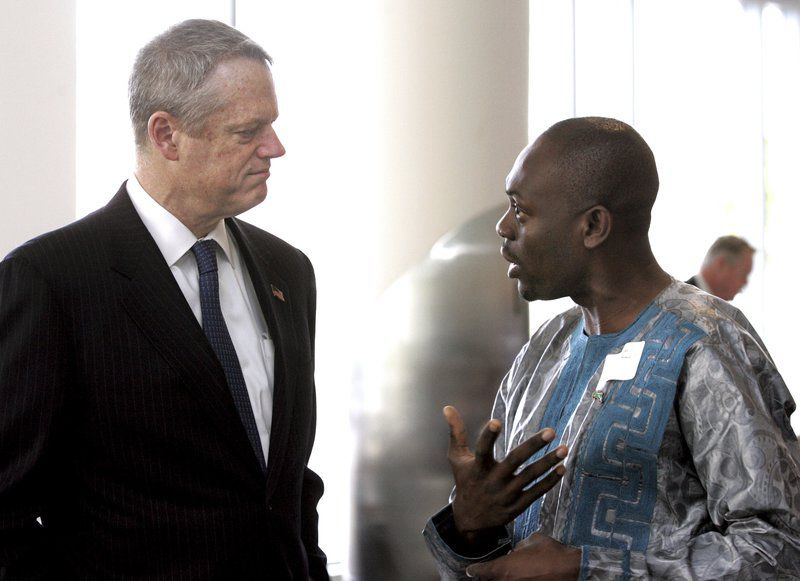SALEM — Gov. Charlie Baker gave the North Shore Alliance for Economic Development an update Tuesday on efforts to reform the MBTA after the snow debacle of the winter of 2015, then added a personal reflection on battling the opioid addiction crisis in Massachusetts.
Baker, a Swampscott resident, gave a talk that was at times lighthearted, at times emotional, and at times full of policy initiatives for a gathering of business people, college officials, and lawmakers at the Marsh Hall Dining Common at Salem State University.
Those in attendance stood and applauded him at the end.
Salem State President Patricia Meservey, who serves as the alliance’s chairwoman, introduced Baker, alluding to his scheduled discussion of MBTA reform.

“I’m tempted to go to the jokes about snow,” Meservey said. The tough winter provided a test of Baker’s leadership shortly after becoming governor, she noted. “It showed a great deal about what we could expect about his leadership as we went through that difficult winter.”
Baker, in turn, joked that “our winter resiliency plan worked so well, this past winter we only had 30 inches of snow.”
“It was obviously a big ‘gotcha’ moment for public transportation and for the transit system generally,” he added, in looking back at the winter before last. He credited the Legislature for recognizing the “bellwether opportunity” to make reforms.
‘Just didn’t stick’
Baker also discussed the need to battle the state’s opioid addiction crisis, a focus he gained during town hall meetings when he was running for governor in 2014. People would come up to him, knowing he was “a health care guy,” he said.
Baker is the former CEO of Harvard Pilgrim Health Care and former state secretary of Health and Human Services in the 1990s. Everywhere he went, he said, people began to tell him stories of loved ones, friends or neighbors who were either battling addiction, in recovery or lost.
“I can’t tell you how many tears were shed in front of me, over and over and over again, over the course of the campaign by people telling me their stories,” Baker said.
The problem hit home for him when he thought about his oldest son, Charlie, 25, who played football in college as a defensive end, and who took pain pills while playing.
Charlie was the team captain his senior year, and he wanted to play, so he took pills at times during the season to deal with pain, Baker explained. And in the last game, Charlie tore a ligament that runs across the top of his foot, an injury that required major surgery and the use of pain medications for several months.
“I’m a health guy, remember,” Baker said. “This was five or six years ago. And I didn’t have any appreciation for just how damn dangerous these things were, and no one said anything to us about it,” he continued, raising his voice. “Nothing! So we just filled the prescriptions and gave them to my son.”
“By some act of God, it just didn’t stick,” Baker added, and his son did not become addicted.
So, when parents came up to him and told him stories of their sons and daughters, fighting addiction due to pills they took to fight sports injuries, those stories hit home.
“All I could think about,” Baker said, choking up, “was my son Charlie. And somehow he dodged the biggest bullet of all time.”
Opioid addiction is everywhere in the state, the governor noted.
“It’s not them, it’s us,” he said. “It’s not a character flaw, it’s a chronic disease.”
And in many cases, the health care community, Baker said, helped create the crisis. He praised the Legislature for putting together a task force that came up with 50 recommendations.
“We are in the midst of implementing almost all of them,” he said.
After departing Salem, Baker appeared at a press conference at the Statehouse with state Attorney General Maura Healey and other officials to announce the Make the Right Call campaign, a $250,000 initiative urging those who witness an overdose to call 911, given legal protection under the state’s 2012 Good Samaritan Law. Healey said a person who calls 911 to save someone’s life would not be prosecuted for drug use or possession.
More on MBTA reforms
Baker also thanked lawmakers on Tuesday for approving reforms to the MBTA that also created the new Fiscal and Management Control Board, an oversight board that has brought the agency’s operations into the light.
He gave a simple example of progress.
In the first four months of this year, compared with the same period last year, the reduction in absenteeism, unscheduled absences and overtime created 16,000 new days of work at the MBTA, Baker said to loud applause from those in the room at Salem State.
“The reason that really matters is there has been about a 25 percent drop in missed bus routes over that period of time, and missed runs on the T,” said Baker. This, in turn, creates more capacity, fewer missed trips, and less crowded buses and trains.
“I think what is clear is the Legislature and the governor are working very well together,” said state Rep. Lori Ehrlich, D-Marblehead, who also took note of Baker’s genuine approach to problem-solving.
“I think when you are genuine in that way, it comes through in better policy,” she said.
State Rep. Jerry Parisella, D-Beverly, said making transportation more reliable is key for Beverly, which has five commuter rail stops with more than 2,000 people a day who commute by train.

